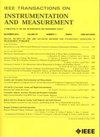基于无偏最小方差估计的时变未知输入约束UKF非线性动态室内热剖面估计
IF 5.9
2区 工程技术
Q1 ENGINEERING, ELECTRICAL & ELECTRONIC
IEEE Transactions on Instrumentation and Measurement
Pub Date : 2025-09-04
DOI:10.1109/TIM.2025.3606059
引用次数: 0
摘要
估计室内供暖、通风和空调(HVac)系统的未知输入,特别是在各种环境约束和时变相对湿度的影响下,提出了一个重大挑战。一个可行的解决方案是使用加权最小二乘(WLS)方法来估计未知输入,该方法将无偏最小方差(UMV)估计器与基于无scented卡尔曼滤波(UKF)的非线性滤波技术相结合。这允许同时估计系统状态和未知输入。为了准确地表示受这些不确定输入影响的实际非线性热剖面,必须采用基于RC网络的数学建模方法来捕获系统随时间的动态行为。基于UMV的最优估计器与UKF的集成最终形成了未知输入的UKF与UMV (UKF-UMV- ui)估计算法。在实验室规模的现实环境中,对所提出的UKF-UMV-UI算法进行了广泛的实验,处理了不确定和具有挑战性的未知输入。研究结果表明,在两种不同的测量条件下,所提出的方法在累积均方误差(CuMSE)上分别优于未知输入UKF (UKF- ui)的41.64%和35.85%。本文章由计算机程序翻译,如有差异,请以英文原文为准。
Time-Varying Unknown Input Constrained UKF With Unbiased Minimum Variance Estimator for Nonlinear Dynamic Indoor Thermal Profile Estimation
Estimating unknown inputs in indoor heating, ventilation, and air conditioning (HVac) systems, particularly under the influence of diverse environmental constraints and time-varying relative humidity, presents a significant challenge. A viable solution is to use a weighted least-squares (WLS) approach for estimating unknown inputs, which uses an unbiased minimum variance (UMV) estimator in conjunction with an unscented Kalman filter (UKF)-based nonlinear filtering technique. This allows for the simultaneous estimation of the system’s state and the unknown inputs. To accurately represent the real-life nonlinear thermal profile influenced by these uncertain inputs, it is essential to adopt an RC network-based mathematical modeling approach that captures the system’s dynamic behavior over time. The integration of the UMV-based optimal estimator with the UKF culminates in the proposed UKF with UMV for unknown inputs (UKF-UMV-UI) estimation algorithm. Extensive experimentation with the proposed UKF-UMV-UI algorithm has been conducted in a laboratory-scale realistic environment, dealing with uncertain and challenging unknown inputs. The results of the investigation indicate that the proposed method outperforms the UKF with unknown input (UKF-UI) by 41.64% and 35.85% in cumulative mean squared error (CuMSE) for two distinct measurement conditions, respectively.
求助全文
通过发布文献求助,成功后即可免费获取论文全文。
去求助
来源期刊

IEEE Transactions on Instrumentation and Measurement
工程技术-工程:电子与电气
CiteScore
9.00
自引率
23.20%
发文量
1294
审稿时长
3.9 months
期刊介绍:
Papers are sought that address innovative solutions to the development and use of electrical and electronic instruments and equipment to measure, monitor and/or record physical phenomena for the purpose of advancing measurement science, methods, functionality and applications. The scope of these papers may encompass: (1) theory, methodology, and practice of measurement; (2) design, development and evaluation of instrumentation and measurement systems and components used in generating, acquiring, conditioning and processing signals; (3) analysis, representation, display, and preservation of the information obtained from a set of measurements; and (4) scientific and technical support to establishment and maintenance of technical standards in the field of Instrumentation and Measurement.
 求助内容:
求助内容: 应助结果提醒方式:
应助结果提醒方式:


